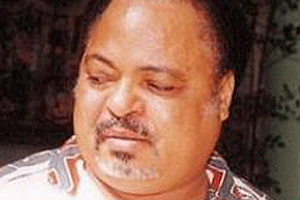
THE outcome of the forthcoming Copac Second all-stakeholders’ conference largely depends on the will of the three principals of the Global Political Agreement, particularly President Robert Mugabe, analysts and political parties have said.
Report by Patrice Makova
The conference, which was supposed to be held this week, was postponed to the third week of October due to logistical and financial problems. It is the next step before a referendum is held.
The conference had been in doubt after Zanu PF rubbished the Copac draft and made wholesale amendments to the document. The party recently made an about-turn, allowing the event to go ahead.
However, questions still persist whether or not Zanu PF is going to allow the conference to go ahead without any problems. The first all-stakeholders’ conference in July 2009 was marred by chaos and violence. It had to take the intervention of Mugabe, Prime Minister Morgan Tsvangirai of MDC-T and deputy premier Arthur Mutambara — then MDC leader — for the meeting to proceed.
University of Zimbabwe Political Science lecturer Shakespeare Hamauswa said Mugabe, Tsvangirai and Welshman Ncube of MDC have to take decisive action to ensure that shadowy organisations like Chipangano will not cause disturbances again.
“The whole process has been shrouded in serious political struggles and controversies,” he said. “The principals, in particular Mugabe, who controls the state security machinery, have to stamp their authority if normalcy has to prevail.”
Hamauswa said it was clear delegates would be powerless and it would be entirely up to the principals and their negotiators to decide on the way forward.
- Chamisa under fire over US$120K donation
- Mavhunga puts DeMbare into Chibuku quarterfinals
- Pension funds bet on Cabora Bassa oilfields
- Councils defy govt fire tender directive
Keep Reading
Political analyst Ernest Mudzengi said a deadlock was likely because of lack of consensus between Zanu PF and the two MDC formations.
He said the National Statistical Report, which Zanu PF insists on using, should have been published before the conference to allow delegates to thoroughly scrutinise the document before it was discussed. The report captures the views gathered during the Copac outreach programmes.
“The success of the conference is in limbo because I foresee the political parties playing hide and seek,” said Mudzengi. “The best they can do is to present the agreed draft before the all-stakeholders’ conference.” Zanu PF’s Copac technical adviser Godwills Masimirembwa said the Copac draft would be subjected to scrutiny.
“Let not anyone daydream that the proposed amendments have fallen away,” he said. “Zanu PF will be out in full force to put forward its amendments and Copac is obliged to capture them in the report which will be presented to the principals,” Masimirembwa said.
He said the conference would be forced to look at whether the draft was consistent with what the people said, as captured in the National Statistical Report.
But MDC director for policy and research, Qhubani Moyo, said if the conference was to discuss the report, it should then follow that provincial, district and ward reports should also be put into consideration. “The politicians have spoken and the only logical thing is to allow people to decide through a referendum,” he said.
MDC-T secretary-general and Finance minister Tendai Biti said it was not practical for the conference to renegotiate the Copac draft as demanded by Zanu PF.
“Anyone nursing the ideas that over 1 000 delegates can debate the draft constitution obviously wants to kill that conference,” he said. “The National Statistical Report which Zanu PF wants is not a true reflection of what people said. It was based on how many people one party managed to bus and intoxicate.”
Zanu PF has made several amendments to the Copac draft, but the two MDCs have rejected them insisting the proposed draft charter was final, as all three political parties appended their signatures to the document.
Among its amendments, Zanu PF retained Mugabe’s “imperial powers” and removed devolution entirely from the draft, while introducing mandatory national youth service.
The party also removed a provision for an Independent Prosecuting authority, separate from the Attorney-General. The party also banned dual citizenship and put provisions that specifically criminalise homosexuality.
Conference will be a success — Mandaza
Political analyst Ibbo Mandaza said the conference was going to sail smoothly, predicting that the event would be stage-managed, with delegates carefully chosen.
Mandaza said this was meant to ensure that elections would be held on March 23 next year as insinuated by Mugabe in a recent High Court application seeking an extension of dates for by-elections in vacant constituencies.
“The second all-stakeholders’ conference is simply going to rubber-stamp the Copac draft,” he said at a “New Zimbabwe Lecturer series” on Thursday.
“The likes of Goodson Nguni, who are making noise, have been overtaken by events because the three parties have already agreed on the draft and a referendum which will be held 21 days after the Second all-stakeholders’ Conference.”












